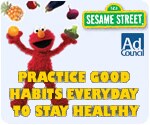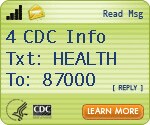Content on this page was developed during the 2009-2010 H1N1 pandemic and has not been updated.
- The H1N1 virus that caused that pandemic is now a regular human flu virus and continues to circulate seasonally worldwide.
- The English language content on this website is being archived for historic and reference purposes only.
- For current, updated information on seasonal flu, including information about H1N1, see the CDC Seasonal Flu website.
Advice for Parents on Talking to Children About Novel H1N1 Flu (Formerly Swine Flu) Concerns
October 23, 2009 2:30 PM ET


 As a parent you know how hard it can be for children to understand stressful situations, such as the current situation of novel H1N1 flu. Stressful situations often cause children to worry and have many questions as to why it is happening and how it can be fixed. It is important to remember to take care of your health and well-being as well as the health of your children. If you cope with a stressful situation well, your children will also cope better. Your confidence and calm attitude will help your children ease their worries and feel safe and secure.
As a parent you know how hard it can be for children to understand stressful situations, such as the current situation of novel H1N1 flu. Stressful situations often cause children to worry and have many questions as to why it is happening and how it can be fixed. It is important to remember to take care of your health and well-being as well as the health of your children. If you cope with a stressful situation well, your children will also cope better. Your confidence and calm attitude will help your children ease their worries and feel safe and secure.
Here are some helpful tips on what you can do for your children:
- Keep activities as consistent and normal as possible even if your normal routine changes (due to daycare or school closures).
- Ask your children what they have heard about novel H1N1 flu. Answer questions openly and honestly, at a level they can understand. Be concrete and do not avoid difficult questions. (See Talking With Children About Flu for more information on talking tips).
- Allow your children to express their feelings and concerns. Let them know it is okay to be afraid or mad. Ask questions so you can help them identify and cope with their feelings.
- Children always need to feel safe and loved. When they are uncertain about situations and afraid they may need even more affection and attention.
- Limit exposure to media and adult conversations about novel H1N1 flu . If your children are watching T.V. try to watch with them or make sure you are available to answer questions about what they have heard.
- As appropriate, encourage healthy behaviors: eating well, sleeping well, playing outside.
- Use their questions as an opportunity to let them know what they can do to avoid getting novel H1N1 flu.
Focus on what your child can do to avoid getting novel H1N1 flu:
- Wash hands frequently with soap and water for 20 seconds (long enough for children to sing the “Happy Birthday” song twice). Be sure to set a good example by doing this yourself.
- Cough and sneeze into a tissue. (If a tissue is used, throw the tissue away immediately).
- Be sure to set a good example by doing this yourself.
- Stay at least six feet away from people who are sick.
- Stay home from school if sick, and stay away from sick people until they are better.
For More Information
Get email updates
To receive weekly email updates about this site, enter your email address:
Contact Us:
- Centers for Disease Control and Prevention
1600 Clifton Rd
Atlanta, GA 30333 - 800-CDC-INFO
(800-232-4636)
TTY: (888) 232-6348 - Contact CDC-INFO


